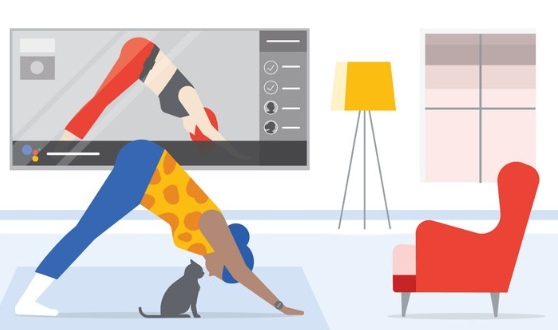Digital wellbeing tips from Google
Using technology and being online excessively whether for work or leisure can result in physical and emotional burnout. Here are some reminders to help balance screen time and reduce digital fatigue:
Use your voice
With custom or ready-made Routines, you can add voice cues to trigger several actions with one command. For example, you can set, “Hey Google, good morning”, and have the Google Assistant tell you the weather, your upcoming events, open your alarm, and much more.
Google Assistant is built-in to some Android devices and as an app, it can be downloaded on Play Store and App Store.
Find active alternatives
 Working remotely means getting many video calls and to avoid fatigue, you should schedule breaks in-between virtual meetings to rest your mind. The World Health Organization recommends getting at least 150 minutes of physical activity per week. Get up from your workstation and add a physical activity such as a quick run, bike ride, or take a walk while answering a call. To monitor if you are doing enough movement, you can use the Google Fit app to keep track and earn heart points. No matter how big or small your movement is, it has tremendous health benefits which improves mental health and helps you sleep better. The Google Fit app can work without any wearable device.
Working remotely means getting many video calls and to avoid fatigue, you should schedule breaks in-between virtual meetings to rest your mind. The World Health Organization recommends getting at least 150 minutes of physical activity per week. Get up from your workstation and add a physical activity such as a quick run, bike ride, or take a walk while answering a call. To monitor if you are doing enough movement, you can use the Google Fit app to keep track and earn heart points. No matter how big or small your movement is, it has tremendous health benefits which improves mental health and helps you sleep better. The Google Fit app can work without any wearable device.
Discuss and plan tech use with kids
 If you have kids, it is important to monitor their online activities and daily screen time. You can find numerous kid-friendly content online and you can use it to plan out their activities for listening, watching, and playing on their devices. Use this family guide to initiate conversations with your children to find out about content they like, talk about smart online habits, and other digital topics.
If you have kids, it is important to monitor their online activities and daily screen time. You can find numerous kid-friendly content online and you can use it to plan out their activities for listening, watching, and playing on their devices. Use this family guide to initiate conversations with your children to find out about content they like, talk about smart online habits, and other digital topics.
Create a consistent bedtime routine

It is also recommended to put away phones to fall asleep easier and sleep better. Being exposed to blue light can have a negative effect on one’s natural sleep cycles by delaying release of melatonin and increasing alertness. Instead of using your device in the bed, try reading a book or listening to an audio program to lull yourself to sleep. Start with having 30-minutes of screen-free time, and work your way up to two hours or more until you are comfortable without using your phone before bedtime.
For more digital wellbeing resources, visit wellbeing.google.




